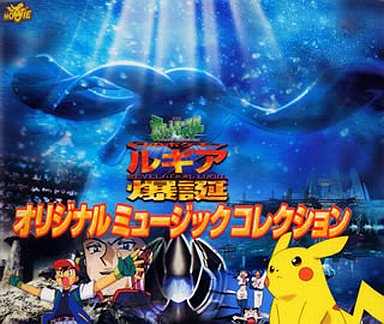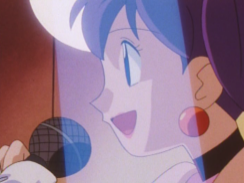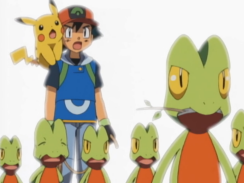



Main
Old Updates Archive
Links
 |
Lists |
List of Pokemon
Pokemon World Atlas
List of Techniques
List
of Items
List of TV Episodes
 |
Guides |
Episode
Comparisons
Movies
& Specials Guide
CD Guide
DVD Guide
Voice
Actors Guide
Lyrics Archive
Manga Guide
Video Games
 |
Miscellaneous |
Humor
Pokemon Bashing
Features
Rants
E-Mail Me
Dogasu's
Backpack
| Movies & Specials Guide | Revelation Lugia

The CD soundtrack to the second Pocket Monsters movie, Pocket Monsters The Movie "Revelation Lugia," is a very unique beast. While the soundtrack for every other movie in this franchise has been a collection of the background music and theme songs used in the movies themselves, a large portion of the CD release of Revelation Lugia is made up of brand new songs created exclusively for the soundtrack.
Let’s take a look at the track list to see what I’m talking about.
We have eleven tracks totaling at about 33 minutes on a single CD. The soundtrack to the first movie, on the other hand, had 25 tracks and had a runtime of about 42 minutes. This is not including the hour-long Birth of Mewtwo radio drama. While that was not every piece of music from the first movie (there are quite a few unreleased tracks) it's still a fairly significant amount.
So let's take a close look at what's on the CD. There's the opening theme, The Rivals, sung by Satoshi’s voice actor Rica Matsumoto and the ending theme, toi et moi, performed by Namie Amuro. So far, so good.
Next up we get background music…all six tracks of them. Some of the movie’s most memorable themes are in there – Gelardan’s Theme, Fleura’s Flute, etc. – but the overwhelming majority of the movie’s music score is just not there. A lot of it will end up being used during pivotal moments in the TV series from Johto all the way up into the Diamond & Pearl era but yet none of that is included here. According to this excellent page over on the fansite PocketMonsters.net there's about 22 pieces of unreleased background music from the second movie alone. Twenty-two! Add to that all the unreleased music from the accompanying Pikachu short and you've this huge library of music that, for one reason or another, just never got any sort of official release.
But we do get three image songs so...yay? An image song, for those of you not familiar with the term, is basically the Japanese equivalent of when movie soundtracks in the West have those “songs inspired by the hit motion picture” banners plastered across the front cover. It's music that isn’t featured in the movie itself but is included on the soundtrack anyway to help fill out the disc and give record labels something to brag about.
In Revelation Lugia’s case, the image songs used are sung by the characters in the movie. The songs are I Am a Collector by Gelardan (Takeshi Kaga), The Endless World by Fleura (Akiko Hiramatsu), and Because Everyone Was There by Satoshi (Rica Matsumoto).
...And that's it!
So to sum it all up: we have an eleven track, 33 minute CD that’s missing a ton of background music but also has space taken up by random image songs not heard in the actual film itself. This had never been done before with this franchise and hasn’t been done in the nearly 20 years since. So what in the world is going on here?
There are a number of possible explanations. Maybe Japan was trying to imitate what the U.S. did with its soundtrack to Pokémon The First Movie by filling it with songs “inspired by the hit motion picture?” It's possible. Having Namie Amuro – who has often been described as “the Queen of Japanese Pop” - perform the movie’s ending theme certainly seems like an attempt to give the soundtrack the same kind of pop appeal that the American soundtrack for the first movie had. “This is what the soundtracks to American movies are like,” I’m imagining Media Factory saying. “Let's get our own version of Christina Aguilera on this thing."
At first glance The Endless World may seem like a random image song performed by Fleura's voice actor but there's actually more to the story; it's been heavily implied that it was originally meant to be the film's ending theme but was swapped out with toi et moi at the last minute! You can read more about that whole saga on the page I made for the film's theme song here.

The Rica Matsumoto song is interesting because we actually do know a little bit about what went on behind the scenes there. In 2011 Media Factory released The Best of Pokémon Songs Performed by Rica Matsumoto, a CD collecting all of the songs Ms. Matsumoto had done for the franchise up to that point. The booklet that came along with the CD includes a section where Ms. Matsumoto reflects on each song and gives us some behind the scenes info not printed anywhere else. Here’s what she said about Minna ga Ita Kara ("Because Everyone Was There"), the image song from the second movie’s soundtrack.
So a conversation with the movie’s music producers resulted in the song being written specifically for the movie’ soundtrack? Sure, why not?

Meanwhile, over on the CD single for Sora Tobu Pokémon Kids, there are two other songs not used in the actual movie itself: Mama’s Dear Pokémon and The Great Tree and Its Friends. That first one’s performed by Becky, the celebrity who also sings the Pikachu short’s ending theme, and is probably another case of “well, she’s already here, might as well get one more song out of her.” The CD also, predictably, has zero background music from the Pikachu short Pikachu’s Exploration Team.
Both Mama’s Dear Pokémon and Because Everyone Was There and would eventually be dusted off and used years later – the former in the late Johto Pocket Monsters episode “The Twin Pupurin vs. Purin! The Singing Pokémon Concert!” and the latter in the Advanced Generation episode “The Forest of Kimori! Protect the Colossal Tree!” I Am a Collector and The Endless World have yet to appear in the TV series but I think it’s fairly obvious why they haven’t.
The only song whose raison d'être I have trouble explaining is Ware wa Collector ("I Am a Collector"). I suppose it’s possible that the movie producers saw that they had Takeshi Kaga at their disposal and decided to make use of him while they could, because why not? Mr. Kaga is known to most Westerners as Chairman Kaga on the TV series The Iron Chef but back in Japan he’s more famous for his work with the Shiki Theater Company (劇団四季), the Japanese equivalent of Broadway. By 1999 he had starred in the Japanese versions of Jesus Christ Superstar (Jesus Christ), West Side Story (Tony), and Les Miserables (Jean Valjean), among many, many others. And, well, if you have a musical theater superstar on your cast then why not use him?
They had Masachika Ichimura at their disposal the previous year but didn’t create any Mewtwo image songs for him to sing despite him being an even bigger name in the musical theater scene than Mr. Kaga was. So maybe that's the point? Maybe the producers of the movie saw Mr. Ichimura as a missed opportunity and didn’t want to squander Mr. Kaga the same way? And so they made up a character image song to serve as an excuse to get Mr. Kaga back in front of a mic?
This is all just wild speculation on my part, but it does make a certain amount of sense, doesn't it?
The soundtrack to Revelation Lugia is unique. The soundtrack to the following year’s movie won’t have any image songs on it and the rest of the movies’ soundtracks will focus mainly on the background music composed by Shinji Miyazaki. It's weird and I don't know why they made the decisions they did but let's all hope that one day they release a full, complete soundtrack to the second Pocket Monsters movie.

The CD soundtrack to the second Pocket Monsters movie, Pocket Monsters The Movie "Revelation Lugia," is a very unique beast. While the soundtrack for every other movie in this franchise has been a collection of the background music and theme songs used in the movies themselves, a large portion of the CD release of Revelation Lugia is made up of brand new songs created exclusively for the soundtrack.
| What’s on the CD |
Let’s take a look at the track list to see what I’m talking about.
| Disc One (CD) |
||
| 01 |
Pocket
Monsters The Movie Title Theme 劇場版ポケットモンスタータイトルテーマ |
|
| 02 |
The Rivals!! (Full Size) (Rica
Matsumoto) ライバル! (フルサイズ) (松本梨香) |
The
opening theme to Revelation Lugia.
Performed by Rica Matsumoto. |
| 03 |
Gelardan's Theme ジラルダンのテーマ |
|
| 04 |
I Am a Collector (Takeshi Kaga) 我はコレクター (鹿賀丈史) |
Image
song performed by Takeshi Kaga in-character as Gelardan. |
| 05 |
Fleura's
Flute フルーラの笛 |
|
| 06 |
The
Endless World (Akiko Hiramatsu) はてしない世界(平松晶子) |
Image song performed by Akiko Hiramatsu in-character as Fleura. |
| 07 |
Thunder
Appears! サンダー登場! |
|
| 08 |
Because
Everyone Was There (Rica Matsumoto) みんながいたから(松本梨香) |
Image
song performed by Rica Matsumoto as Satoshi. |
| 09 |
Escape! 脱出! |
|
| 10 |
The
Pulse of the Planet 惑星の鼓動 |
|
| 11 |
toi
et moi (Full Size) (Namie Amuro) toi et moi(トワ エ モア)(フルサイズ)(安室奈美恵) |
The
ending theme to Revelation Lugia.
Performed by Namie Amuro. |
We have eleven tracks totaling at about 33 minutes on a single CD. The soundtrack to the first movie, on the other hand, had 25 tracks and had a runtime of about 42 minutes. This is not including the hour-long Birth of Mewtwo radio drama. While that was not every piece of music from the first movie (there are quite a few unreleased tracks) it's still a fairly significant amount.
So let's take a close look at what's on the CD. There's the opening theme, The Rivals, sung by Satoshi’s voice actor Rica Matsumoto and the ending theme, toi et moi, performed by Namie Amuro. So far, so good.
Next up we get background music…all six tracks of them. Some of the movie’s most memorable themes are in there – Gelardan’s Theme, Fleura’s Flute, etc. – but the overwhelming majority of the movie’s music score is just not there. A lot of it will end up being used during pivotal moments in the TV series from Johto all the way up into the Diamond & Pearl era but yet none of that is included here. According to this excellent page over on the fansite PocketMonsters.net there's about 22 pieces of unreleased background music from the second movie alone. Twenty-two! Add to that all the unreleased music from the accompanying Pikachu short and you've this huge library of music that, for one reason or another, just never got any sort of official release.
But we do get three image songs so...yay? An image song, for those of you not familiar with the term, is basically the Japanese equivalent of when movie soundtracks in the West have those “songs inspired by the hit motion picture” banners plastered across the front cover. It's music that isn’t featured in the movie itself but is included on the soundtrack anyway to help fill out the disc and give record labels something to brag about.
In Revelation Lugia’s case, the image songs used are sung by the characters in the movie. The songs are I Am a Collector by Gelardan (Takeshi Kaga), The Endless World by Fleura (Akiko Hiramatsu), and Because Everyone Was There by Satoshi (Rica Matsumoto).
...And that's it!
So to sum it all up: we have an eleven track, 33 minute CD that’s missing a ton of background music but also has space taken up by random image songs not heard in the actual film itself. This had never been done before with this franchise and hasn’t been done in the nearly 20 years since. So what in the world is going on here?
| What’s going on? |
There are a number of possible explanations. Maybe Japan was trying to imitate what the U.S. did with its soundtrack to Pokémon The First Movie by filling it with songs “inspired by the hit motion picture?” It's possible. Having Namie Amuro – who has often been described as “the Queen of Japanese Pop” - perform the movie’s ending theme certainly seems like an attempt to give the soundtrack the same kind of pop appeal that the American soundtrack for the first movie had. “This is what the soundtracks to American movies are like,” I’m imagining Media Factory saying. “Let's get our own version of Christina Aguilera on this thing."
At first glance The Endless World may seem like a random image song performed by Fleura's voice actor but there's actually more to the story; it's been heavily implied that it was originally meant to be the film's ending theme but was swapped out with toi et moi at the last minute! You can read more about that whole saga on the page I made for the film's theme song here.

The Rica Matsumoto song is interesting because we actually do know a little bit about what went on behind the scenes there. In 2011 Media Factory released The Best of Pokémon Songs Performed by Rica Matsumoto, a CD collecting all of the songs Ms. Matsumoto had done for the franchise up to that point. The booklet that came along with the CD includes a section where Ms. Matsumoto reflects on each song and gives us some behind the scenes info not printed anywhere else. Here’s what she said about Minna ga Ita Kara ("Because Everyone Was There"), the image song from the second movie’s soundtrack.
| 6. Minna ga Ita Kara (Because
Everyone Was There) Sometimes I'll go back and look at my previous work and when I see how hard I worked and how full of life Satoshi is I give myself a little push on the back like "Hang in there! Don't give up!" Similarly, whenever I listen to this song I cheer myself up and say things like "You're not alone!" and "Keep it up!" Actually, this song allows Satoshi to express feelings he wasn't able to show in the movie Revelation Lugia. I had a talk with the music producer and told him that "Satoshi definitely feels that "I'm standing where I am now because everyone was there for me"" and so they decided to make this song for the movie's soundtrack for me. I ad-libbed the last part of the song that goes "Because everyone was there / because everyone was there / alright, let's go / lalala..." |
So a conversation with the movie’s music producers resulted in the song being written specifically for the movie’ soundtrack? Sure, why not?

Meanwhile, over on the CD single for Sora Tobu Pokémon Kids, there are two other songs not used in the actual movie itself: Mama’s Dear Pokémon and The Great Tree and Its Friends. That first one’s performed by Becky, the celebrity who also sings the Pikachu short’s ending theme, and is probably another case of “well, she’s already here, might as well get one more song out of her.” The CD also, predictably, has zero background music from the Pikachu short Pikachu’s Exploration Team.
 |
 |
Both Mama’s Dear Pokémon and Because Everyone Was There and would eventually be dusted off and used years later – the former in the late Johto Pocket Monsters episode “The Twin Pupurin vs. Purin! The Singing Pokémon Concert!” and the latter in the Advanced Generation episode “The Forest of Kimori! Protect the Colossal Tree!” I Am a Collector and The Endless World have yet to appear in the TV series but I think it’s fairly obvious why they haven’t.
The only song whose raison d'être I have trouble explaining is Ware wa Collector ("I Am a Collector"). I suppose it’s possible that the movie producers saw that they had Takeshi Kaga at their disposal and decided to make use of him while they could, because why not? Mr. Kaga is known to most Westerners as Chairman Kaga on the TV series The Iron Chef but back in Japan he’s more famous for his work with the Shiki Theater Company (劇団四季), the Japanese equivalent of Broadway. By 1999 he had starred in the Japanese versions of Jesus Christ Superstar (Jesus Christ), West Side Story (Tony), and Les Miserables (Jean Valjean), among many, many others. And, well, if you have a musical theater superstar on your cast then why not use him?
They had Masachika Ichimura at their disposal the previous year but didn’t create any Mewtwo image songs for him to sing despite him being an even bigger name in the musical theater scene than Mr. Kaga was. So maybe that's the point? Maybe the producers of the movie saw Mr. Ichimura as a missed opportunity and didn’t want to squander Mr. Kaga the same way? And so they made up a character image song to serve as an excuse to get Mr. Kaga back in front of a mic?
This is all just wild speculation on my part, but it does make a certain amount of sense, doesn't it?
| Final Thoughts |
The soundtrack to Revelation Lugia is unique. The soundtrack to the following year’s movie won’t have any image songs on it and the rest of the movies’ soundtracks will focus mainly on the background music composed by Shinji Miyazaki. It's weird and I don't know why they made the decisions they did but let's all hope that one day they release a full, complete soundtrack to the second Pocket Monsters movie.
Found an error? Spot an omission? Please help me keep this page current and error-free by e-mailing me with a description of the error or omission.

